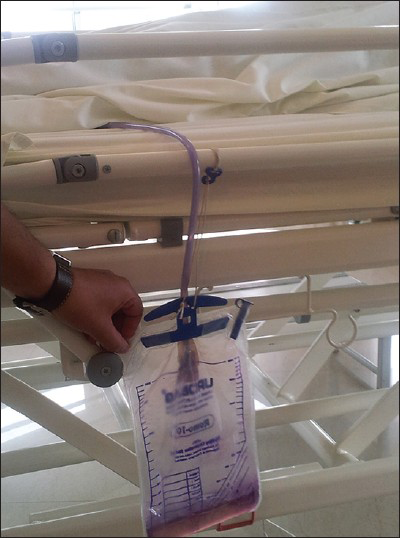Translate this page into:
Indigo color urine in hemodialysis patient
Address for correspondence: Dr. Prashant Nasa, 71/9, 1st Floor, Prem Nagar, Janakpuri, New Delhi, India. E-mail: dr.prashantnasa@hotmail.com
This is an open-access article distributed under the terms of the Creative Commons Attribution-Noncommercial-Share Alike 3.0 Unported, which permits unrestricted use, distribution, and reproduction in any medium, provided the original work is properly cited.
This article was originally published by Medknow Publications & Media Pvt Ltd and was migrated to Scientific Scholar after the change of Publisher.
A 35-year-old man with chronic kidney disease (CKD) secondary to neurogenic bladder on long-term indwelling Foley's catheter was noted to have indigo-colored urine in the bag [Figure 1]. There were no symptoms suggestive of urinary tract infection. Urine routine, microscopy and culture were sent. Microscopic examination of the urine sample revealed 10-12 leukocytes/hpf and leukocyte esterase was positive. Urine culture showed the growth of Pseudomonas aeruginosa. The patient was started on oral ciprofloxacin in renal-modified doses and Foley's catheter was changed. He was treated for 7 days and repeat urine culture was sterile with normal-colored urine on his next hemodialysis session.

- Indigo color urine
Urinary tract infection with microbes like Providencia stuartii, Providencia rettgeri, Klebsiella pneumoniae, Proteus mirabilis, Escherichia coli, Morganella morganii, and Pseudomonas aeruginosa can produce the enzyme indoxyl phosphatase. This converts indoxyl sulfate in the urine into indirubin and indigo-colored metabolites.[1] Our case highlights this association for the first time in a hemodialysis patient. Nephrologists and dialysis unit staff should be aware of this entity while managing patients on long-term indwelling Foley's catheters.
Source of Support: Nil
Conflict of Interest: None declared.






